Ellen and Julia Lupton on “Precrastinating” and Designing Productive Lives
March 09, 2018 | Filed in: Woman of the Week
On paper, identical twins Ellen and Julia Lupton have starkly different résumés—Ellen is a curator at the Cooper Hewitt, Smithsonian Design Museum and teaches at the Maryland Institute College of Art in Baltimore, while Julia is a professor of English at the University of California Irvine, where she also oversees the Shakespeare Center. But in practice, their careers are totally intertwined, linked by daily phone calls and countless collaborations, both formal and informal. Here, they discuss growing up as a unit, feeding off each other’s ideas, and fostering a healthy mutual competition.
ON COMPETITION
ELLEN: As identical twins, we were best friends, and it was hard for anyone else to get in there. Then, in high school, we made a conscious decision to split, and things became a bit more competitive between us. We decided that I was the artist and Julia was the writer and academic, and that stuck. Julia was a super-serious student, and got a Ph.D; I was more bohemian and experimental with my lifestyle, and barely graduated from high school. But as I started art school, I discovered that I was a good writer, and that I wanted to be a curator and write about design and art. So ultimately, our separation just revealed how much we have in common. Now our careers are much more similar than we expected.
JULIA: Our competition was never mean or undermining. We admire each other, and whenever Ellen does something new, I want to try it too. For example, Ellen’s done a lot of online teaching, and now I’m starting to design a big online Shakespeare class. Part of my motivation is thinking, “Well, Ellen’s been doing this for years, and it’s time to catch up. If she can do it, I can do it.” I would call it emulation more than competition. It’s like we’re on the same basketball team. But still, when we’re together, I sometimes feel inferior.
ELLEN: I feel inferior, too. I think I might feel more judged than I really am, because I hold myself to the standards that Julia sets for herself. But we do have very different points of view. I’m always concerned about the experience of the user or the reader, and the public—it’s important that whatever I do in my work translates well to others. And Julia’s standards are perhaps more complex, because she’s speaking to her academic peers. But I’m also interested in adding to the discourse around design, and making it more critical—and Julia wants to create academic content that matters and is understood by people that aren’t specialists, so we still overlap.
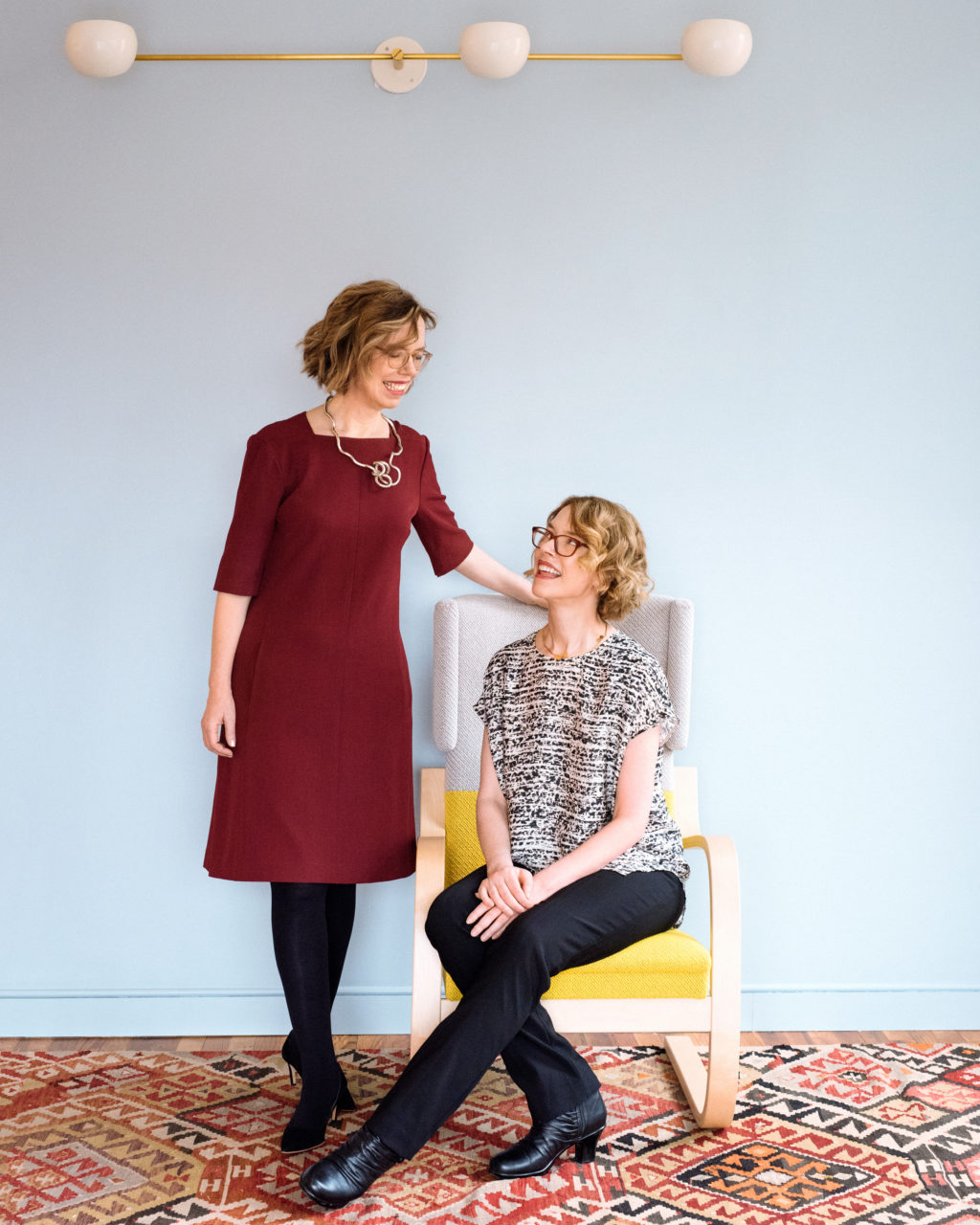
Julia (left) wears the Emily dress in pomegranate and the Vanessa pump in black. Ellen (right) wears the Didion top in ink wash and the Foster pant in black.
ON UPBRINGING
ELLEN: Our parents were both English professors when we were young, and later our father became a house builder. It was a literary, hippie, progressive household, and we were very unkempt and intellectual. We had all kinds of books and magic markers and manual typewriters. We were obsessed with those typewriters.
JULIA: We had a fantasy world where we were book publishers, and we would create elaborate encyclopedias and publications, filled with poetry and articles that we wrote. I think that was foundational to our imaginations and skill sets we use today. And because we managed our own time and creativity, we became very independent and good problem-solvers.
ON DIFFERENTIATING THEMSELVES
JULIA: With Ellen’s help, I have a little bit of design knowledge, and it’s my secret weapon. It’s helped me give visibility to projects that might otherwise be fairly invisible. For example, I run an arts and culture program for the campus, and I worked with one of Ellen’s students to create a name and logo and look for it. Now, everybody knows what it is.
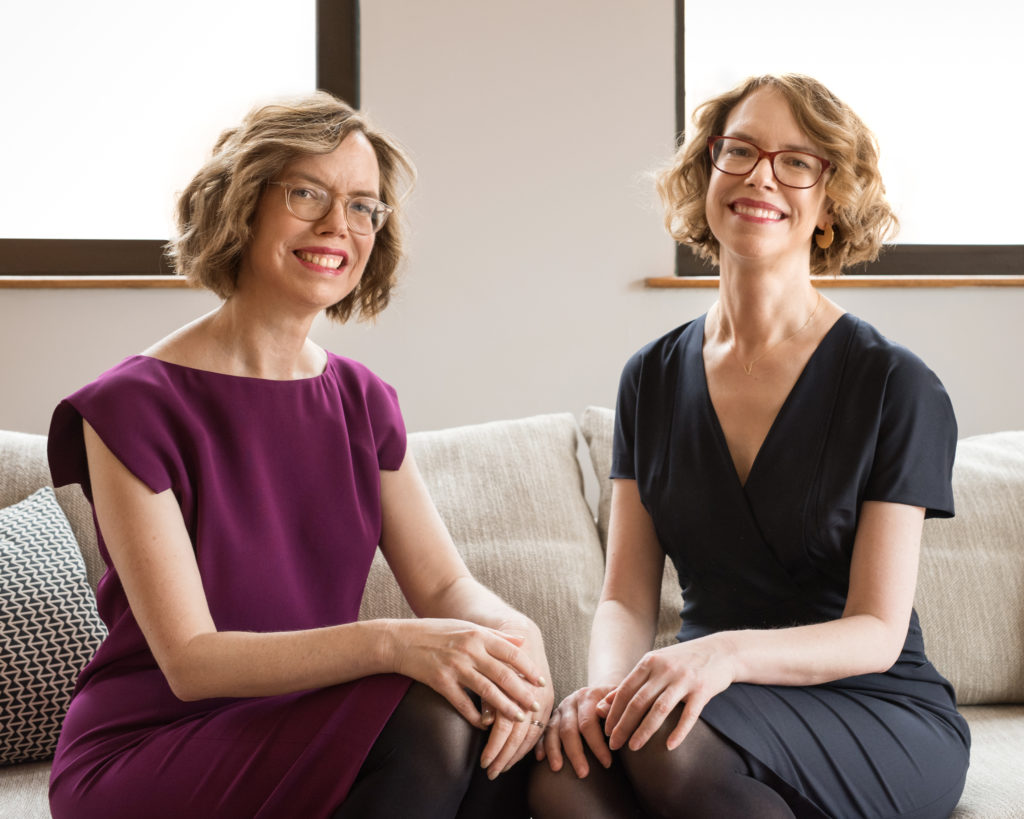
Julia (left) wears the Sarah dress in deep plum. Ellen (right) wears the Emma dress in galaxy blue, the Small Victory necklace, and the Henrietta earrings.
ON COLLABORATING
ELLEN: Our first big project together as adults was a book called DIY Kids, which was a design book for children. We did it with our children, who became laboratory animals for a few years. We live on separate coasts, and so every weekend we would do projects with our kids and photograph them. Then we did a book together called Design Your Life, which is a funny, illustrated book about design, mostly intended for moms. We had so much fun putting it together.
ON DISAGREEMENTS
ELLEN: We have our differences. For example, Julia’s very religious, and I’m not. But in terms of work, we’re so similar. We love teaching each other things. I’ve taught Julia how to use Adobe Creative Suite, which practically no other English Ph.D knows anything about. And she’s taught me how to read critical theory and French philosophy, which opened my mind to a new method of thinking that I use every day. We share recipes. We share fashion advice.
JULIA: One source of conflict is travel. I tend to bring a lot of stuff with me, particularly books and more outfits than I really need. But Ellen travels very light, and she’s quick on her feet. We were recently in New York together and she referred to my big roller suitcase as “your car,” and I was very ashamed. I also have a big wallet and a big purse, and I carry around a lot of papers and books. Ellen just has a tiny little purse that basically holds her phone and—I wouldn’t even call it a wallet; it’s just a folder with very little in it.
ELLEN: I pack light; Julia packs heavy. I like knowing that I can lift my bag with my own body. I’m often traveling in cities, and it’s no fun to drag a huge suitcase into the depths of the subway. The city of Venice outlawed roller bags because they make too much noise rumbling over the cobblestones. Carrying less stuff is liberating. Wheels are supposed to make you feel unencumbered, but they can trick you into packing more than you can reasonably handle.
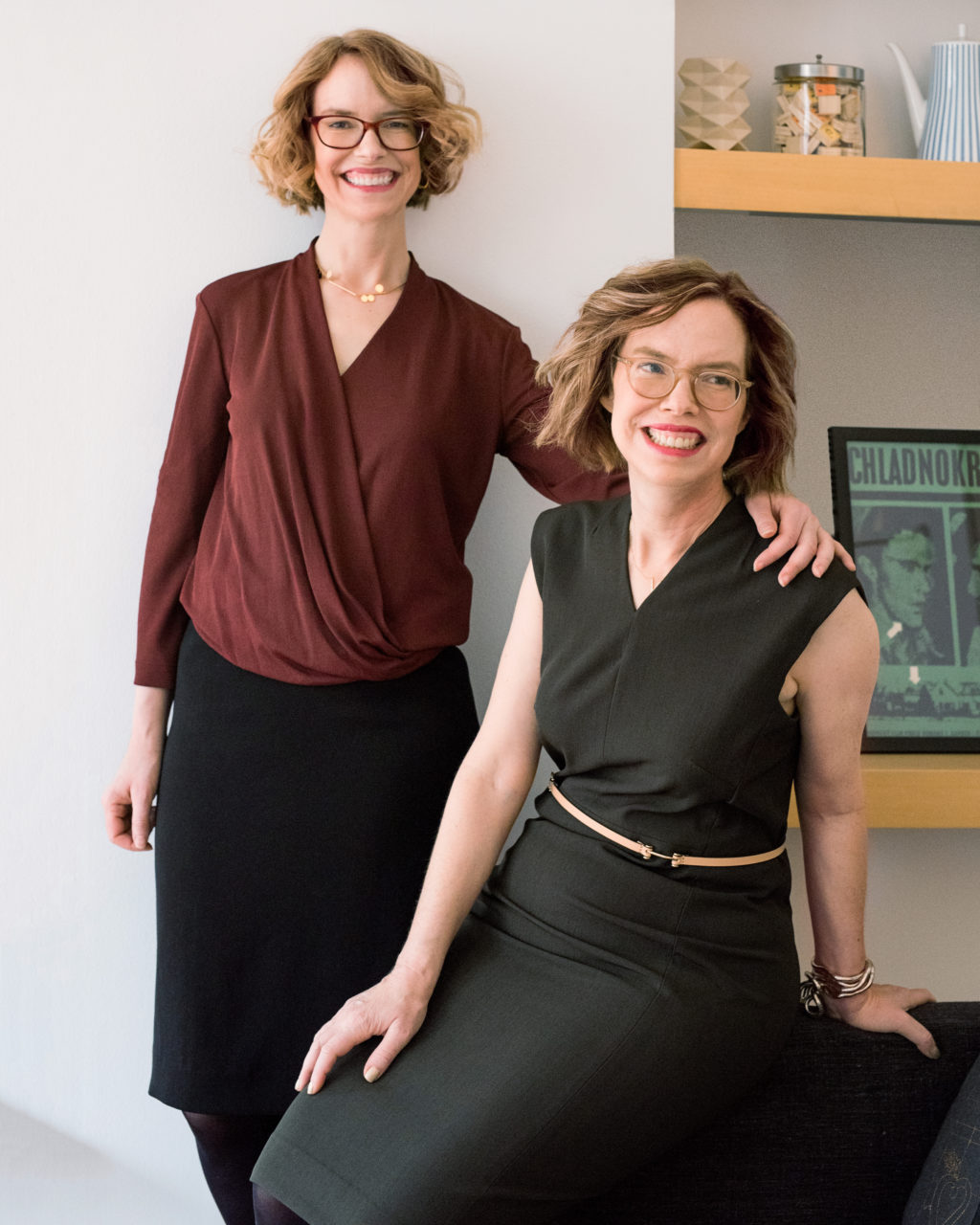
Ellen (left) wears the Deneuve top in chocolate and the Cobble Hill skirt in black. Julia (right) wears the Aditi dress in dark pine, the Bridle belt, and the Small Victory necklace.
ON DRESSING ALIKE
JULIA: Ellen is into design, so everything she wears is a little edgier and more sophisticated. I dress well in the context of academia, but that’s kind of a low bar—there’s a lot of schlumpy, thoughtless clothing. I’m an associate dean, so I interact with donors and other administrators and program officers, and I want to look put together.
ELLEN: I like to be comfortable and functional, and I choose things that are easy to wear. I like putting things together that make me look taller, and not too old or too young. As we’ve grown older, we’ve gotten more interested in our alikeness: When we’re together, we like to dress very similarly.
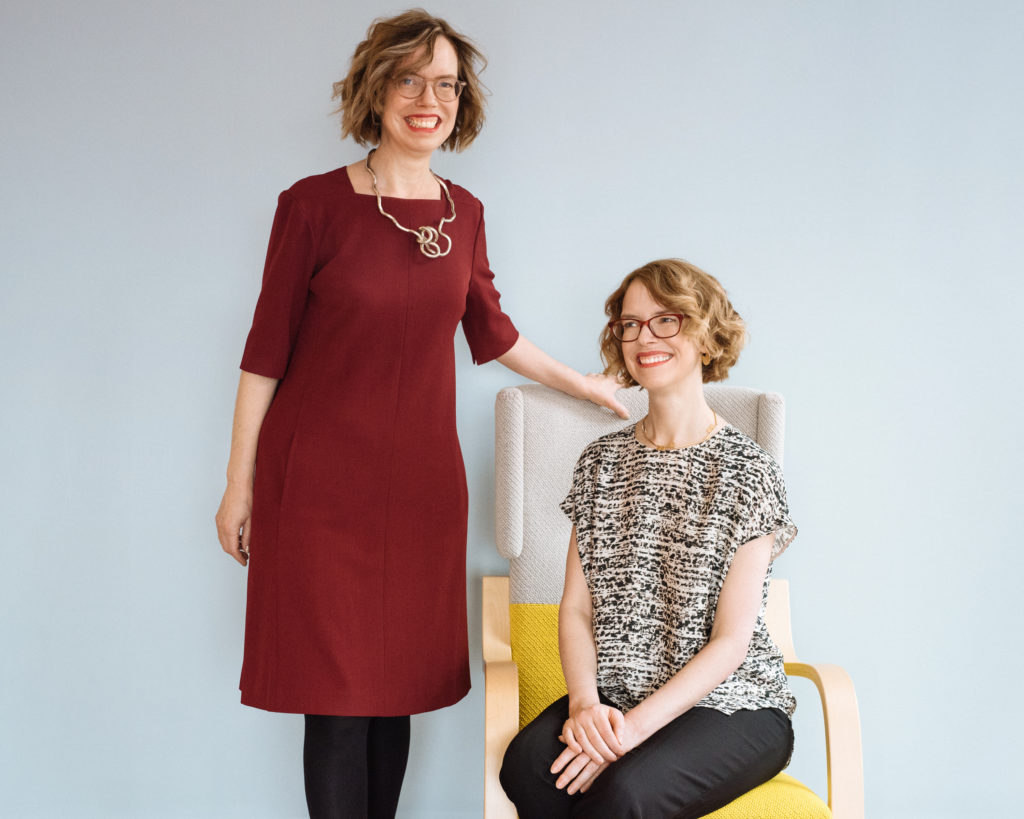
Julia (left) wears the Emily dress in pomegranate. Ellen (right) wears the Didion top in ink wash and the Foster pant in black.
ON WORK HACKS
JULIA: Ellen taught me that it increases productivity to have two screens instead of one, so I encourage it with my colleagues. It’s an important life hack. There’s good research behind it.
ELLEN: It’s essential—it’s like having three desks. You can have your spreadsheet and your InDesign and your Google window all open at the same time. That’s my big recommendation to any busy person: Have more screens on your desk. When I have to work on my laptop—which I do pretty often, because I travel—I feel like I’m in a closet. I’ll save certain tasks for my two screens—I call them “the twins.”
JULIA: Also, we’re both “precrastinators.” We do everything too early. In general, it can be a good thing, but there are downsides.
ELLEN: You have to control the impulse to precrastinate. If you do something too early, you’re more likely to submit or push “send” when a project isn’t quite right yet. It’s important to wait another day, let it marinate, and then send it. For example, you may write a paragraph, and think, “I’m going to show everybody right now,” but it will be better if you wait until tomorrow; when you read it again in the morning, you’ll find an adverb that should not be there. Still, it’s better to be a precrastinator than a procrastinator. Some people are very critical of precrastinators, but I think they’re just jealous.
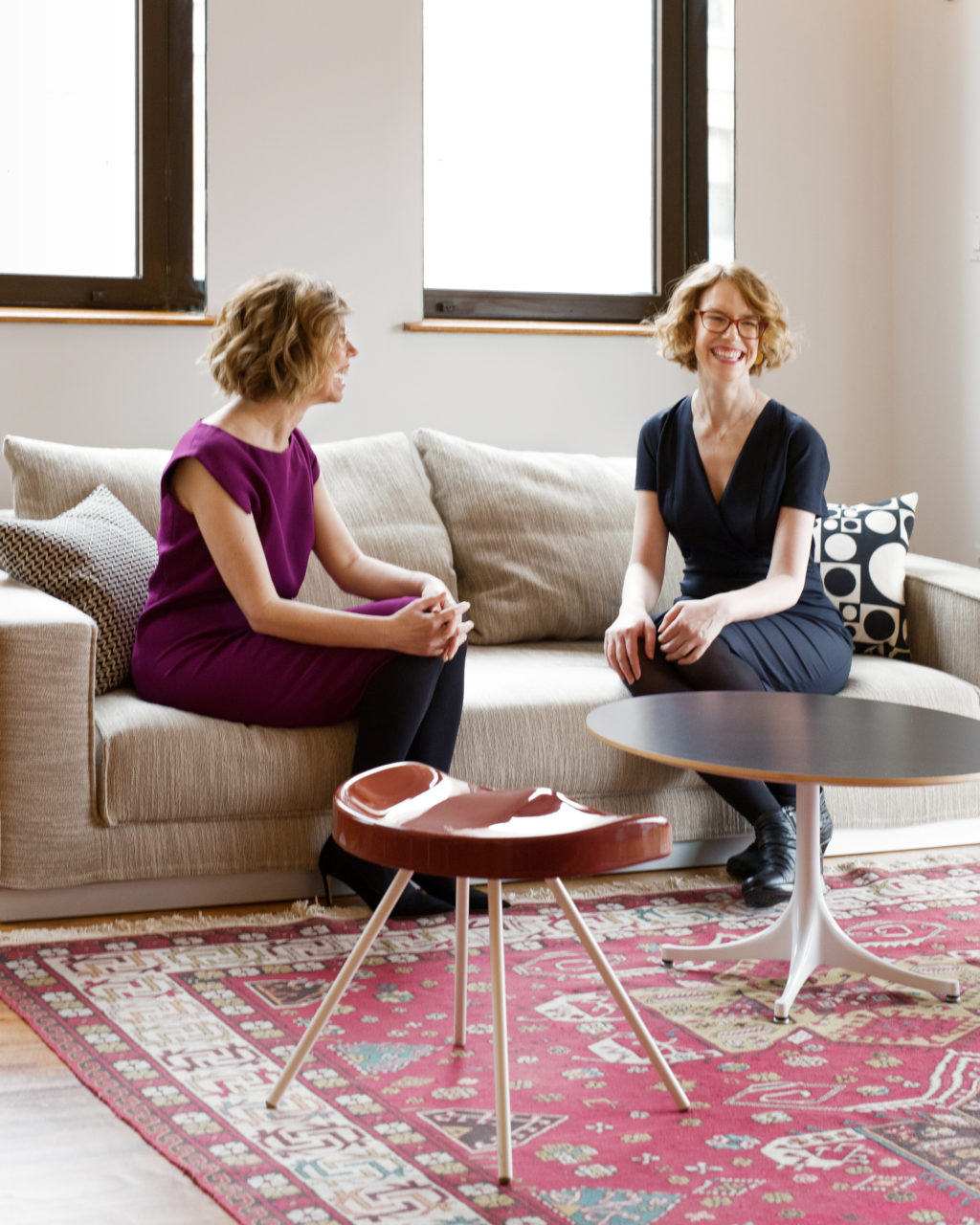
Julia (left) wears the Sarah dress in deep plum and the Vanessa pump in black. Ellen (right) wears the Emma dress in galaxy blue, the Small Victory necklace, and the Henrietta earrings.
ON CAREER DOUBTS—OR LACK THEREOF
JULIA: I feel confident in my career now. But when I had very small children, I wasn’t sure if I would ever be able to continue with my career as I had imagined it. I had triplets when my oldest child was three, which was a bit of a trauma. It was not clear to me that I would ever reclaim my life; I just had this endless vision of being at the beck and call of other people’s needs. And then, of course, my children got older and went to elementary school, and because they are triplets, there was a great joy in seeing them help each other out and entertain each other and require, in some ways, less from me than I expected. But it was hard. I certainly became less productive for a few years, but I also became very efficient with the time that I did have. I became very, very good at turning on creativity when I could. As my children became increasingly independent, I found that I had all of this time that I knew how to use well, and I could get a lot more done in that time than, let’s say, some of my male colleagues who never had to learn to be so efficient.
ELLEN: I’ve been very lucky to have had wonderful, rewarding jobs that offered me great opportunities to grow and learn. My first job after graduating from The Cooper Union was running a small design gallery at the school, which challenged me to write, publish, and learn about how to be a curator. Julia has always been there with me, exposing me to new concepts that I can apply to my work. We have very different careers, yet we are constantly feeding each other’s ideas and energy. Perhaps I’ve never felt lost in my career because she was always supporting and inspiring me.





